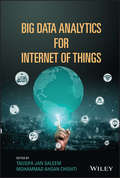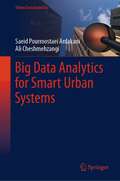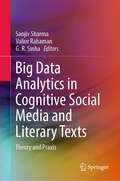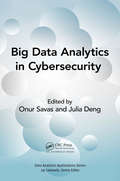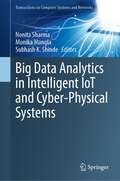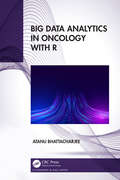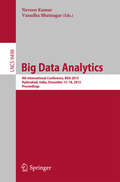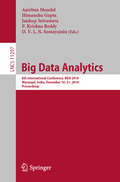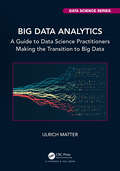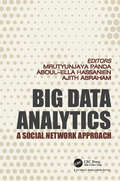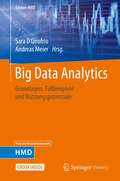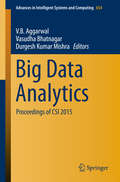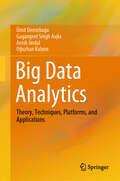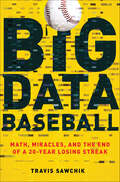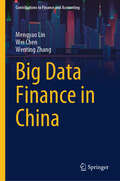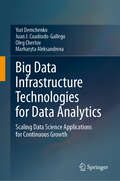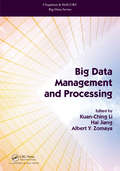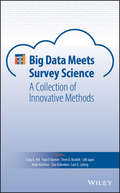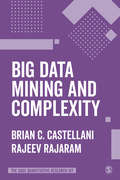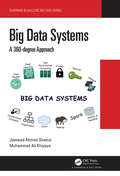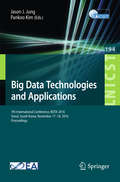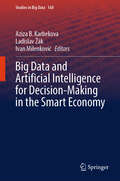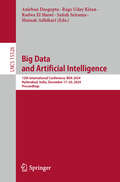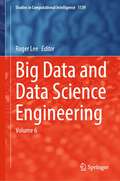- Table View
- List View
Big Data Analytics for Internet of Things
by Mohammad Ahsan Chishti Tausifa Jan SaleemThis book provides a thorough overview of all the aspects of data analytics in IoT systems including need for data analytics, computing platforms, big data analytical tools, data compression and storage, privacy and security etc. It includes discussions of ways to extract valuable insights from Big Data with the help of techniques like Regression, K-Nearest Neighbor, Decision tree, Support Vector Machine, Naïve Bayes, Clustering, Deep Neural Networks etc. The book explains the techniques that are suitable for digging out the best decisions from large amounts of IoT data to gain control of IoT devices. Moreover, the book offers novel designs for IoT systems covering applications like smart homes, smart healthcare, smart transportation, smart manufacturing, smart grid, smart agriculture, smart education, and smart government. The book discusses all aspects of IoT data analytics including presently available strategies as well as loopholes in those strategies and new solutions.
Big Data Analytics for Smart Urban Systems (Urban Sustainability)
by Ali Cheshmehzangi Saeid Pourroostaei ArdakaniBig Data Analytics for Smart Urban Systems aims to introduce Big data solutions for urban sustainability smart applications, particularly for smart urban systems. It focuses on intelligent big data which takes the benefits of machine learning to analyse large and rapidly changing datasets in smart urban systems. The state-of-the-art Big data analytics applications are presented and discussed to highlight the feasibility of big data and machine learning solutions to enhance smart urban systems, smart operations, urban management, and urban governance. The key benefits of this book are, (1) to introduce the principles of machine learning-enabled big data analysis in smart urban systems, (2) to present the state-of-the-art data analysis solutions in smart management and operations, and (3) to understand the principles of big data analytics for smart cities and communities. Endorsements‘Over the many years of collaboration between academia and industry, we noticed the common language is ‘big data’; with that, we have developed novel ideas to bridge the gaps and help promote innovation, technologies, and science’.- Tian Tang, Independent Researcher, China ‘Big Data Analytics is a fascinating research area, particularly for cities and city transformations. This book is valuable to those who think vigorously and aim to act ahead’.- Li Xie, Independent Researcher, China‘For urban critiques, knowledge trains aspiring opportunities toward outstanding manifestations. Smartness has evolved or/ advanced rambunctious & embracing realities along (with) novel directions and nurturing integrated city knowledge’.- Aaron Golden, SELECT Consultants, UK
Big Data Analytics in Cognitive Social Media and Literary Texts: Theory and Praxis
by G. R. Sinha Sanjiv Sharma Valiur RahamanThis book provides a comprehensive overview of the theory and praxis of Big Data Analytics and how these are used to extract cognition-related information from social media and literary texts. It presents analytics that transcends the borders of discipline-specific academic research and focuses on knowledge extraction, prediction, and decision-making in the context of individual, social, and national development. The content is divided into three main sections: the first of which discusses various approaches associated with Big Data Analytics, while the second addresses the security and privacy of big data in social media, and the last focuses on the literary text as the literary data in Big Data Analytics. Sharing valuable insights into the etiology behind human cognition and its reflection in social media and literary texts, the book benefits all those interested in analytics that can be applied to literature, history, philosophy, linguistics, literary theory, media & communication studies and computational/digital humanities.
Big Data Analytics in Cybersecurity (Data Analytics Applications)
by Onur Savas Julia DengBig data is presenting challenges to cybersecurity. For an example, the Internet of Things (IoT) will reportedly soon generate a staggering 400 zettabytes (ZB) of data a year. Self-driving cars are predicted to churn out 4000 GB of data per hour of driving. Big data analytics, as an emerging analytical technology, offers the capability to collect, store, process, and visualize these vast amounts of data. Big Data Analytics in Cybersecurity examines security challenges surrounding big data and provides actionable insights that can be used to improve the current practices of network operators and administrators. Applying big data analytics in cybersecurity is critical. By exploiting data from the networks and computers, analysts can discover useful network information from data. Decision makers can make more informative decisions by using this analysis, including what actions need to be performed, and improvement recommendations to policies, guidelines, procedures, tools, and other aspects of the network processes. Bringing together experts from academia, government laboratories, and industry, the book provides insight to both new and more experienced security professionals, as well as data analytics professionals who have varying levels of cybersecurity expertise. It covers a wide range of topics in cybersecurity, which include: Network forensics Threat analysis Vulnerability assessment Visualization Cyber training. In addition, emerging security domains such as the IoT, cloud computing, fog computing, mobile computing, and cyber-social networks are examined. The book first focuses on how big data analytics can be used in different aspects of cybersecurity including network forensics, root-cause analysis, and security training. Next it discusses big data challenges and solutions in such emerging cybersecurity domains as fog computing, IoT, and mobile app security. The book concludes by presenting the tools and datasets for future cybersecurity research.
Big Data Analytics in Intelligent IoT and Cyber-Physical Systems (Transactions on Computer Systems and Networks)
by Monika Mangla Nonita Sharma Subhash K. ShindeThis book explores the complete system perspective, underlying theories, modeling, and applications of cyber-physical systems (CPS). Considering the interest of researchers and academicians, the editors present this book in a multidimensional perspective covering CPS at breadth. It covers topics ranging from discussion of rudiments of the system and efficient management to recent research challenges and issues. This book is divided into four sections discussing the fundamentals of CPS, engineering-based solutions, its applications, and advanced research challenges. The contents highlight the concept map of CPS including the latest technological interventions, issues, challenges, and the integration of CPS with IoT and big data analytics, modeling solutions, distributed management, efficient energy management, cyber-physical systems research, and education with applications in industrial, agriculture, and medical domains. This book is of immense interest to those in academia and industry.
Big Data Analytics in Oncology with R
by Atanu BhattacharjeeBig Data Analytics in Oncology with R serves the analytical approaches for big data analysis. There is huge progressed in advanced computation with R. But there are several technical challenges faced to work with big data. These challenges are with computational aspect and work with fastest way to get computational results. Clinical decision through genomic information and survival outcomes are now unavoidable in cutting-edge oncology research. This book is intended to provide a comprehensive text to work with some recent development in the area. Features: Covers gene expression data analysis using R and survival analysis using R Includes bayesian in survival-gene expression analysis Discusses competing-gene expression analysis using R Covers Bayesian on survival with omics data This book is aimed primarily at graduates and researchers studying survival analysis or statistical methods in genetics.
Big Data Analytics: 4th International Conference, BDA 2015, Hyderabad, India, December 15-18, 2015, Proceedings (Lecture Notes in Computer Science #9498)
by Naveen Kumar Vasudha BhatnagarThis book constitutes the refereedconference proceedings of the Fourth International Conference on Big DataAnalytics, BDA 2015, held in Hyderabad, India, in December 2015. The 9 revised full papers and 9invited papers were carefully reviewed and selected from 61 submissions andcover topics on big data: security and privacy; big data in commerce; big data:models and algorithms; and big data in medicine.
Big Data Analytics: 6th International Conference, BDA 2018, Warangal, India, December 18–21, 2018, Proceedings (Lecture Notes in Computer Science #11297)
by Jaideep Srivastava P. Krishna Reddy Anirban Mondal Himanshu Gupta D. V. L. N. SomayajuluThis book constitutes the refereed proceedings of the 6th International Conference on Big Data analytics, BDA 2018, held in Warangal, India, in December 2018. The 29 papers presented in this volume were carefully reviewed and selected from 93 submissions. The papers are organized in topical sections named: big data analytics: vision and perspectives; financial data analytics and data streams; web and social media data; big data systems and frameworks; predictive analytics in healthcare and agricultural domains; and machine learning and pattern mining.
Big Data Analytics: A Guide to Data Science Practitioners Making the Transition to Big Data (Chapman & Hall/CRC Data Science Series)
by Ulrich MatterSuccessfully navigating the data-driven economy presupposes a certain understanding of the technologies and methods to gain insights from Big Data. This book aims to help data science practitioners to successfully manage the transition to Big Data. Building on familiar content from applied econometrics and business analytics, this book introduces the reader to the basic concepts of Big Data Analytics. The focus of the book is on how to productively apply econometric and machine learning techniques with large, complex data sets, as well as on all the steps involved before analysing the data (data storage, data import, data preparation). The book combines conceptual and theoretical material with the practical application of the concepts using R and SQL. The reader will thus acquire the skills to analyse large data sets, both locally and in the cloud. Various code examples and tutorials, focused on empirical economic and business research, illustrate practical techniques to handle and analyse Big Data. Key Features: - Includes many code examples in R and SQL, with R/SQL scripts freely provided online. - Extensive use of real datasets from empirical economic research and business analytics, with data files freely provided online. - Leads students and practitioners to think critically about where the bottlenecks are in practical data analysis tasks with large data sets, and how to address them. The book is a valuable resource for data science practitioners, graduate students and researchers who aim to gain insights from big data in the context of research questions in business, economics, and the social sciences.
Big Data Analytics: A Social Network Approach (Studies in Big Data #30)
by Ajith Abraham Mrutyunjaya Panda Aboul HassanienSocial networking has increased drastically in recent years, resulting in an increased amount of data being created daily. Furthermore, diversity of issues and complexity of the social networks pose a challenge in social network mining. Traditional algorithm software cannot deal with such complex and vast amounts of data, necessitating the development of novel analytic approaches and tools. This reference work deals with social network aspects ofbig data analytics. It covers theory, practices and challenges in social networking. The book spans numerous disciplines like neural networking, deep learning, artificial intelligence, visualization, e-learning in higher education, e-healthcare, security and intrusion detection.
Big Data Analytics: Grundlagen, Fallbeispiele und Nutzungspotenziale (Edition HMD)
by Andreas Meier Sara D'OnofrioMit diesem Herausgeberwerk führen die Autoren den Begriff „Big Data Analytics“ ein und geben Fallstudien aus unterschiedlichen Anwendungsgebieten. Unter Big Data Analytics wird das Aufbereiten, Analysieren und Interpretieren von großen, oft heterogenen Datenbeständen verstanden, mit dem Ziel, Muster und Zusammenhänge in den Daten aufzudecken und Entscheidungsgrundlagen für wissenschaftliche, betriebliche oder gesellschaftliche Fragestellungen zu erhalten. Nebst den theoretischen Grundlagen widmet sich das Herausgeberwerk der Vielfalt verschiedener Anwendungsmöglichkeiten. Fallbeispiele geben Einblick in die Anwendung von Big Data Analytics und dessen Nutzenpotenziale. Das Werk richtet sich gleichermaßen an Studierende, Fachleute aller Fachrichtungen als auch an interessierte Anwender. Es hilft den Leserinnen und Leser, die Bedeutungsvielfalt des Begriffs Big Data Analytics zu verstehen und verschiedene Einsatzmöglichkeiten im eigenen Umfeld zu erkennen und zu bewerten.
Big Data Analytics: Proceedings of CSI 2015 (Advances in Intelligent Systems and Computing #654)
by Vasudha Bhatnagar Durgesh Kumar Mishra V. B. AggarwalThis volume comprises the select proceedings of the annual convention of the Computer Society of India. Divided into 10 topical volumes, the proceedings present papers on state-of-the-art research, surveys, and succinct reviews. The volumes cover diverse topics ranging from communications networks to big data analytics, and from system architecture to cyber security. This volume focuses on Big Data Analytics. The contents of this book will be useful to researchers and students alike.
Big Data Analytics: Theory, Techniques, Platforms, and Applications
by Gagangeet Singh Aujla Anish Jindal Ümit Demirbaga Oğuzhan KalyonThis book introduces readers to big data analytics. It covers the background to and the concepts of big data, big data analytics, and cloud computing, along with the process of setting up, configuring, and getting familiar with the big data analytics working environments in the first two chapters. The third chapter provides comprehensive information on big data processing systems - from installing these systems to implementing real-world data applications, along with the necessary codes. The next chapter dives into the details of big data storage technologies, including their types, essentiality, durability, and availability, and reveals their differences in their properties. The fifth and sixth chapters guide the reader through understanding, configuring, and performing the monitoring and debugging of big data systems and present the available commercial and open-source tools for this purpose. Chapter seven gives information about a trending machine learning, Bayesian network: a probabilistic graphical model, by presenting a real-world probabilistic application to understand causal, complex, and hidden relationships for diagnosis and forecasting in a scalable manner for big data. Special sections throughout the eighth chapter present different case studies and applications to help the readers to develop their big data analytics skills using various big data analytics frameworks.The book will be of interest to business executives and IT managers as well as university students and their course leaders, in fact all those who want to get involved in the big data world.
Big Data Baseball: Math, Miracles, and the End of a 20-Year Losing Streak
by Travis SawchikBig Data Baseball provides a behind-the-scenes look at how the Pittsburgh Pirates used big data strategies to end the longest losing streak in North American pro sports history.New York Times BestsellerAfter twenty consecutive losing seasons for the Pittsburgh Pirates, team morale was low, the club’s payroll ranked near the bottom of the sport, game attendance was down, and the city was becoming increasingly disenchanted with its team. Big Data Baseball is the story of how the 2013 Pirates, mired in the longest losing streak in North American pro sports history, adopted drastic big-data strategies to end the drought, make the playoffs, and turn around the franchise’s fortunes.Big Data Baseball is Moneyball for a new generation. Award-winning journalist Travis Sawchik takes you behind the scenes to expertly weave together the stories of the key figures who changed the way the Pirates played the game, revealing how a culture of collaboration and creativity flourished as whiz-kid analysts worked alongside graybeard coaches to revolutionize the sport and uncover groundbreaking insights for how to win more games without spending a dime.From pitch framing to on-field shifts, this entertaining and enlightening underdog story closely examines baseball’s burgeoning big data movement and demonstrates how the millions of data points which aren’t immediately visible to players and spectators, are the bit of magic that led the Pirates to finish the 2013 season in second place and brought an end to a twenty-year losing streak.
Big Data Finance in China (Contributions to Finance and Accounting)
by Wei Chen Wenting Zhang Mengyao LinThis book starts by introducing the background of the era of data elements, clarifies the theoretical basis and technical methods related to big data, and analyzes the specific application of big data technology in China’s banking industry, the insurance industry, securities investment industry, third-party payment, risk supervision, and other fields. application, and thereby finally summarize useful experiences for big data development as well as effective regulation and supervision. We hope that this book can help with subsequent research and application of big data technology in the financial field. This book has a broad audience, especially scholars and practitioners. It is a valuable reference for researchers in related fields, and it can also provide some insights into financial regulators’ awareness of big data finance. Furthermore, it aids in formulating and improving consumption policies, adjusting economic structures, and preventing risks under financial innovation. This research provides valuable guidance for improving financial innovation as well as the effective regulation thereon by financial regulators.
Big Data Infrastructure Technologies for Data Analytics: Scaling Data Science Applications for Continuous Growth
by Oleg Chertov Yuri Demchenko Juan J. Cuadrado-Gallego Marharyta AleksandrovaThis book provides a comprehensive overview and introduction to Big Data Infrastructure technologies, existing cloud-based platforms, and tools for Big Data processing and data analytics, combining both a conceptual approach in architecture design and a practical approach in technology selection and project implementation. Readers will learn the core functionality of major Big Data Infrastructure components and how they integrate to form a coherent solution with business benefits. Specific attention will be given to understanding and using the major Big Data platform Apache Hadoop ecosystem, its main functional components MapReduce, HBase, Hive, Pig, Spark and streaming analytics. The book includes topics related to enterprise and research data management and governance and explains modern approaches to cloud and Big Data security and compliance. The book covers two knowledge areas defined in the EDISON Data Science Framework (EDSF): Data Science Engineering and Data Management and Governance and can be used as a textbook for university courses or provide a basis for practitioners for further self-study and practical use of Big Data technologies and competent evaluation and implementation of practical projects in their organizations.
Big Data Management and Processing (Chapman & Hall/CRC Big Data Series)
by Kuan-Ching Li, Hai Jiang and Albert Y. ZomayaFrom the Foreword: "Big Data Management and Processing is [a] state-of-the-art book that deals with a wide range of topical themes in the field of Big Data. The book, which probes many issues related to this exciting and rapidly growing field, covers processing, management, analytics, and applications... [It] is a very valuable addition to the literature. It will serve as a source of up-to-date research in this continuously developing area. The book also provides an opportunity for researchers to explore the use of advanced computing technologies and their impact on enhancing our capabilities to conduct more sophisticated studies." ---Sartaj Sahni, University of Florida, USA "Big Data Management and Processing covers the latest Big Data research results in processing, analytics, management and applications. Both fundamental insights and representative applications are provided. This book is a timely and valuable resource for students, researchers and seasoned practitioners in Big Data fields. --Hai Jin, Huazhong University of Science and Technology, China Big Data Management and Processing explores a range of big data related issues and their impact on the design of new computing systems. The twenty-one chapters were carefully selected and feature contributions from several outstanding researchers. The book endeavors to strike a balance between theoretical and practical coverage of innovative problem solving techniques for a range of platforms. It serves as a repository of paradigms, technologies, and applications that target different facets of big data computing systems. The first part of the book explores energy and resource management issues, as well as legal compliance and quality management for Big Data. It covers In-Memory computing and In-Memory data grids, as well as co-scheduling for high performance computing applications. The second part of the book includes comprehensive coverage of Hadoop and Spark, along with security, privacy, and trust challenges and solutions. The latter part of the book covers mining and clustering in Big Data, and includes applications in genomics, hospital big data processing, and vehicular cloud computing. The book also analyzes funding for Big Data projects.
Big Data Meets Survey Science: A Collection of Innovative Methods (Wiley Series in Survey Methodology)
by Craig A HillOffers a clear view of the utility and place for survey data within the broader Big Data ecosystem This book presents a collection of snapshots from two sides of the Big Data perspective. It assembles an array of tangible tools, methods, and approaches that illustrate how Big Data sources and methods are being used in the survey and social sciences to improve official statistics and estimates for human populations. It also provides examples of how survey data are being used to evaluate and improve the quality of insights derived from Big Data. Big Data Meets Survey Science: A Collection of Innovative Methods shows how survey data and Big Data are used together for the benefit of one or more sources of data, with numerous chapters providing consistent illustrations and examples of survey data enriching the evaluation of Big Data sources. Examples of how machine learning, data mining, and other data science techniques are inserted into virtually every stage of the survey lifecycle are presented. Topics covered include: Total Error Frameworks for Found Data; Performance and Sensitivities of Home Detection on Mobile Phone Data; Assessing Community Wellbeing Using Google Street View and Satellite Imagery; Using Surveys to Build and Assess RBS Religious Flag; and more. Presents groundbreaking survey methods being utilized today in the field of Big Data Explores how machine learning methods can be applied to the design, collection, and analysis of social science data Filled with examples and illustrations that show how survey data benefits Big Data evaluation Covers methods and applications used in combining Big Data with survey statistics Examines regulations as well as ethical and privacy issues Big Data Meets Survey Science: A Collection of Innovative Methods is an excellent book for both the survey and social science communities as they learn to capitalize on this new revolution. It will also appeal to the broader data and computer science communities looking for new areas of application for emerging methods and data sources.
Big Data Mining and Complexity (The SAGE Quantitative Research Kit)
by Rajeev Rajaram Brian C. CastellaniThis book offers a much needed critical introduction to data mining and ‘big data’. Supported by multiple case studies and examples, the authors provide: Digestible overviews of key terms and concepts relevant to using social media data in quantitative research. A critical review of data mining and ‘big data’ from a complexity science perspective, including its future potential and limitations A practical exploration of the challenges of putting together and managing a ‘big data’ database An evaluation of the core mathematical and conceptual frameworks, grounded in a case-based computational modeling perspective, which form the foundations of all data mining techniques Part of The SAGE Quantitative Research Kit, this book will give you the know-how and confidence needed to succeed on your quantitative research journey.
Big Data Mining and Complexity (The SAGE Quantitative Research Kit)
by Rajeev Rajaram Brian C. CastellaniThis book offers a much needed critical introduction to data mining and ‘big data’. Supported by multiple case studies and examples, the authors provide: Digestible overviews of key terms and concepts relevant to using social media data in quantitative research. A critical review of data mining and ‘big data’ from a complexity science perspective, including its future potential and limitations A practical exploration of the challenges of putting together and managing a ‘big data’ database An evaluation of the core mathematical and conceptual frameworks, grounded in a case-based computational modeling perspective, which form the foundations of all data mining techniques Part of The SAGE Quantitative Research Kit, this book will give you the know-how and confidence needed to succeed on your quantitative research journey.
Big Data Systems: A 360-degree Approach
by Jawwad Ahmad ShamsiBig Data Systems encompass massive challenges related to data diversity, storage mechanisms, and requirements of massive computational power. Further, capabilities of big data systems also vary with respect to type of problems. For instance, distributed memory systems are not recommended for iterative algorithms. Similarly, variations in big data systems also exist related to consistency and fault tolerance. The purpose of this book is to provide a detailed explanation of big data systems. The book covers various topics including Networking, Security, Privacy, Storage, Computation, Cloud Computing, NoSQL and NewSQL systems, High Performance Computing, and Deep Learning. An illustrative and practical approach has been adopted in which theoretical topics have been aided by well-explained programming and illustrative examples. Key Features: Introduces concepts and evolution of Big Data technology. Illustrates examples for thorough understanding. Contains programming examples for hands on development. Explains a variety of topics including NoSQL Systems, NewSQL systems, Security, Privacy, Networking, Cloud, High Performance Computing, and Deep Learning. Exemplifies widely used big data technologies such as Hadoop and Spark. Includes discussion on case studies and open issues. Provides end of chapter questions for enhanced learning.
Big Data Technologies and Applications: 7th International Conference, BDTA 2016, Seoul, South Korea, November 17–18, 2016, Proceedings (Lecture Notes of the Institute for Computer Sciences, Social Informatics and Telecommunications Engineering #194)
by Jason J. Jung Pankoo KimThis book constitutes the refereed post-conference proceedings of the 7th International Conference on Big data Technologies and Applications, BDTA 2016, held in Seoul, South Korea, in November 2016. BDTA 2016 was collocated with the First International Workshop on Internet of Things, Social Network, and Security in Big Data, ISSB 2016 and the First International Workshop on Digital Humanity with Big Data, DiHuBiDa 2016. The 17 revised full papers were carefully reviewed and selected from 25 submissions and handle theoretical foundations and practical applications which premise the new generation of data analytics and engineering.
Big Data and Artificial Intelligence for Decision-Making in the Smart Economy (Studies in Big Data #168)
by Aziza B. Karbekova Ladislav Žák Ivan MilenkovićThis book focuses on the systemic scientific-methodological and practical exploration of organizational-technical and socio-economic issues related to the automation of decision-making in the smart economy under Industry 4.0 using big data and artificial intelligence (AI). The scientific novelty of the results presented in the book lies in uncovering the “black box” of decision-making automation in the smart economy through these technologies. The book clarifies the role and significance of big data and AI in decision-making within the smart economy, highlighting its fundamental importance. Additionally, the book thoroughly discusses international experiences in decision-making automation in the smart economy, with examples from Armenia, Kyrgyzstan, and other Central Asian countries, demonstrating its empirical value. The book reveals advanced organizational-economic models for decision-making based on big data and AI. It also presents the latest trends in the development of the smart economy using big data and AI. Moreover, the book explains the socio-ecological and legal aspects of the ethics in applying big data and AI technologies. Additionally, the book proposes prospective applied solutions for decision-making in the smart economy based on big data and AI. The target audience of the book includes scientists studying big data and AI.
Big Data and Artificial Intelligence: 12th International Conference, BDA 2024, Hyderabad, India, December 17–20, 2024, Proceedings (Lecture Notes in Computer Science #15526)
by Anirban Dasgupta Rage Uday Kiran Radwa El Shawi Satish Srirama Mainak AdhikariThis book constitutes the proceedings of the 12th International Conference on Big Data and Artificial Intelligence, BDA 2024, held in Hyderabad, India, during December 17–20, 2024. The 16 full papers and 12 short papers presented here were carefully reviewed and selected from 106 submissions. These papers have been categorized under the following topical sections: Image Classification; Graph Analytics; Big Data Analytics; Applications; Data Science; Health-Care Analytics; eLearning; Prediction and Forecasting.
Big Data and Data Science Engineering: Volume 6 (Studies in Computational Intelligence #1139)
by Roger LeeThe book reports state-of-the-art results in Big Data and Data Science Engineering in both printed and electronic form. Studies in Computation Intelligence (SCI) has grown into the most comprehensive computational intelligence research forum available in the world. This book publishes original papers on both theory and practice that address foundations, state-of-the-art problems and solutions, and crucial challenges.
